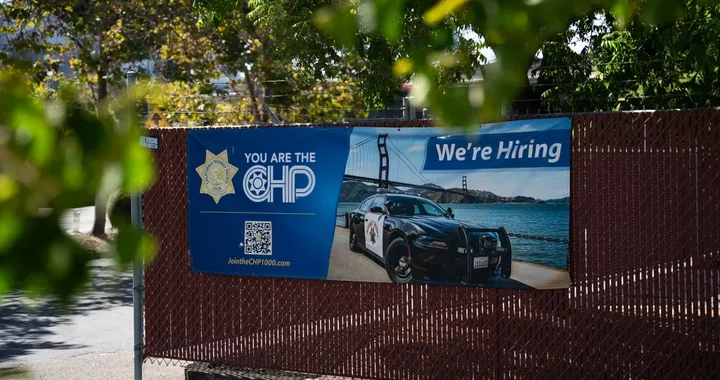Jobs
1 in 6 CHP Jobs Are Vacant — Despite Historic Raises and Newsom’s Hiring Campaign

A sign advertising job availability with the California Highway Patrol in front of the agency’s Oakland office on Aug. 13, 2024. Photo by Florence Middleton, CalMatters
About one in six California Highway Patrol positions are vacant, a rate much higher than in 2019, despite massive raises in the last two years.
The jobs are unfilled at a sensitive time for Gov. Gavin Newsom, whose administration earlier this month agreed to a new contract with the union that represents CHP officers. The deal is expected to cost $489 million over the next three years through a combination of raises and enhanced pay incentives.
Newsom has been deploying CHP officers to combat local crime challenges in Oakland and other cities. He’s also been promoting a recruiting campaign called CHP 1000 that he launched in 2022 to hire hundreds of new officers.
CHP officers got a 7.9% wage increase in 2023, marking their biggest raise in 20 years. In 2022, they received a 6.2% general salary increase. Both are historically high raises for the officers.
Rookie CHP officers today can expect to earn up to $117,000 in the first year on duty, according to the agency.
For reasons the Legislative Analyst’s Office couldn’t explain in a report released last week, the CHP officer vacancy rate skyrocketed by 94% between 2015-2023. In 2019, just 5% of CHP positions were unfilled. Today, the vacancy rate exceeds 16%, although the CHP has said it received far more applications to its academy in the first half of this year than than in the same period in 2023.
Part of the problem, the analyst’s office report contends, is that the CHP doesn’t face any consequences for failing to make new hires.
“The current formula does not contain any factor that adjusts pay increases based on the success or failure of CHP to actually recruit and retain employees,” according to the report.
Raises for CHP officers by state law are based on the average compensation at five other law enforcement agencies: The Los Angeles County Sheriff’s Office and the police departments in Los Angeles, San Diego, Oakland and San Francisco, the five biggest police jurisdictions at the time the law was passed in 1974.
It’s considered a good deal for the union, the California Association of Highway Patrolmen, because it doesn’t have to negotiate with the governor over wage increases. It’s the only state employee union with that arrangement.
When it comes to pay, most California Highway Patrol officers don’t live in the five biggest police jurisdictions in the state, and the Legislative Analyst’s Office wants to know why they’re paid like police and sheriff’s deputies in California’s most expensive metro areas. The office in 2007 encouraged lawmakers to repeal the provision in state law that gives CHP officers automatic pay raises.
“These jurisdictions possibly were a representative sample of the cost of living where CHP officers worked in 1974,” according to the Legislative Analyst’s Office report. “These five jurisdictions today represent among the most expensive regions of the state and are not where many highway patrol officers work.”
Aside from continuing the pay formula for CHP raises, the new contract includes several other perks to boost retention. They include a new level of a seniority pay for officers with more 27 years of experience, who will get an incentive worth 10% of their base wages; a small boost in pay for officers with motorcycle assignments, who will get an an incentive amounting to 5% of their base pay instead of 4%; and additional compensation for officers who work police dogs.
###
CalMatters.org is a nonprofit, nonpartisan media venture explaining California policies and politics.









